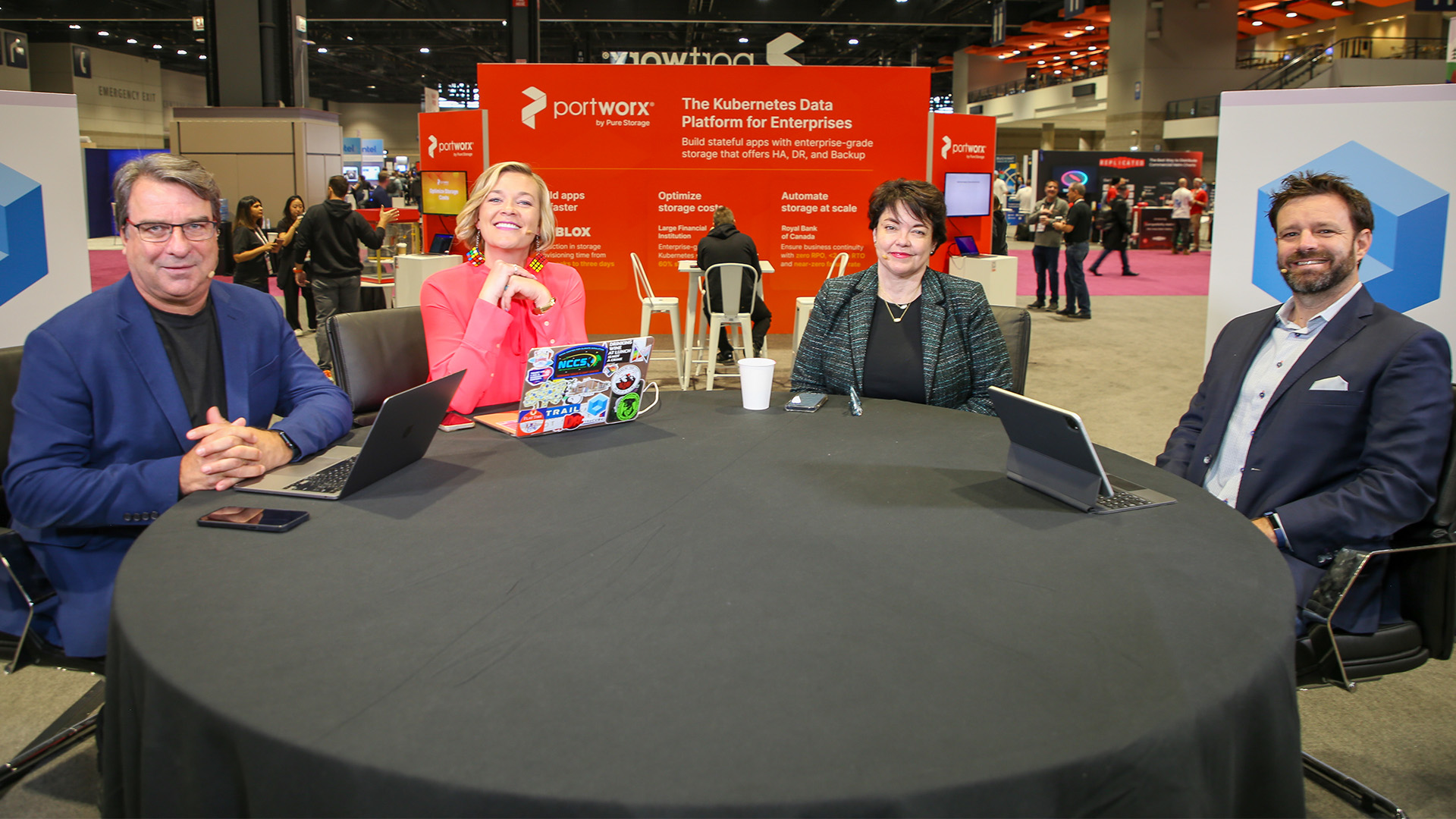 AI
AI
 AI
AI
 AI
AI
The pulse of cloud-native innovation continued to beat on day two of the KubeCon + CloudNativeCon NA event.
The conference brings together industry experts and companies across the board to navigate the complexities and opportunities within the Kubernetes ecosystems. The thriving network is critical, according to John Furrier (pictured, left), co-host of theCUBE, SiliconANGLE Media’s livestreaming studio.
“You can see it’s thriving from an ecosystem standpoint, so check the box on that,” he said. “And that’s a good sign, especially in this market.”
Day two of the event promised to delve deeper into platform engineering practices, with a keen eye on addressing next-level security challenges and establishing best practices for operational stability and data recovery. Furrier’s insights pointed to a trend where Kubernetes is becoming an under-the-hood enabler, allowing for more sophisticated infrastructure work to take place.
Furrier spoke with his co-analysts Savannah Peterson (second from left) and Dustin Kirkland (right), as well as Jo Peterson (second from right), industry analyst, vice president of cloud and security for Clarify 360, and principal analyst for ClearTech Research (right), at KubeCon + CloudNativeCon NA, during an exclusive broadcast on theCUBE, SiliconANGLE Media’s livestreaming studio. They discussed the evolving role of Kubernetes, artificial intelligence and the potential of quantum computing. Plus, security and AI were noted as significant opportunities for innovation, and the integration of AI into interfaces was highlighted as a current trend. (* Disclosure below.)
During the day two kickoff segment, theCUBE analysts talked with Jo Peterson, whose work includes benchmarking and baselining the footprints of large private equities, which is critical in understanding today’s cloud environments. As companies grapple with the intricacies of cloud integration, the role of security in the present cloud landscape is vital.
“Cloud security is still evolving,” Peterson pointed out, indicating a sector ripe for innovation and growth. Security is not just about the protective measures one puts in place, but also about understanding the broader implications of those measures within the architectural ecosystem.
“You’re starting to see platforms evolve that are making silo tooling become a thing of the past,” she said, suggesting a trend toward more integrated, holistic security solutions.
This shift is significant in a world where threats are becoming more sophisticated and the networks more interconnected.
Looking beyond security, there is a synergy emerging between AI and Kubernetes. The transformative power of AI is crucial, according to Kirkland.
“We have now laid the infrastructure for artificial intelligence through Kubernetes,” he said.
This marriage of technologies is not just about the capabilities of today, but the potential of tomorrow. The analyst panel’s views reflect a market on the brink of substantial change, fueled by the integration of AI into mainstream cloud services.
The role of AI in simplifying the complex can’t be overstated.
“It’s going to grow faster as more people use AI; they’re going to figure it out,” Furrier said.
As Kubernetes continues to mature, its ability to enable AI to operate at scale becomes more evident. The analysts see this as an opportunity, not just for the tech giants, but for the entire ecosystem, including the rising startups and innovative projects within the Cloud Native Computing Foundation.
The Kubernetes journey is intersecting with broader technological trends, such as AI and quantum computing. This evolution will continue to gain strength quickly, according to the analysts.
“Kubernetes helps with the dynamic scale-out,” Kirkland noted, suggesting that we are just scratching the surface of what’s possible when AI and cloud computing converge.
In the future, Kubernetes will act as a bedrock for AI infrastructure. AI has transcended the realm of science fiction. Case in point: OpenAI has already achieved remarkable progress in a short timeframe.
“We are still in such an early stage,” said Savannah Peterson, who hinted at the seismic changes yet to come as technology continues to evolve at a breakneck pace.
In an industry where complexity is the norm, the quest for simplicity remains central. The AI and cloud convergence will ease these complexities.
“There’s lots of opportunities to innovate by just making things a little bit easier to use, a little bit more accessible, a little bit more available,” Kirkland said.
This reinforces the idea that the future belongs to those who can demystify technology and make it more approachable.
Here’s the complete video interview, part of SiliconANGLE’s and theCUBE’s coverage of KubeCon + CloudNativeCon NA:
(* Disclosure: TheCUBE is a paid media partner for KubeCon + CloudNativeCon NA. Neither Red Hat and CNCF, the main sponsors of theCUBE’s event coverage, nor other sponsors have editorial control over content on theCUBE or SiliconANGLE.)
Support our mission to keep content open and free by engaging with theCUBE community. Join theCUBE’s Alumni Trust Network, where technology leaders connect, share intelligence and create opportunities.
Founded by tech visionaries John Furrier and Dave Vellante, SiliconANGLE Media has built a dynamic ecosystem of industry-leading digital media brands that reach 15+ million elite tech professionals. Our new proprietary theCUBE AI Video Cloud is breaking ground in audience interaction, leveraging theCUBEai.com neural network to help technology companies make data-driven decisions and stay at the forefront of industry conversations.